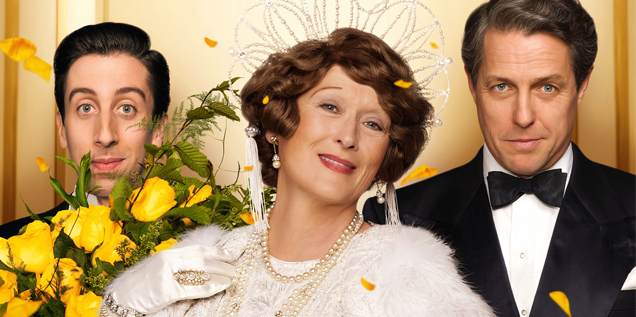As a child, the heiress Florence Foster Jenkins was a talented piano player who scored herself a gig at the White House. Many years later, however, after recovering from a bout of syphilis (courtesy of a husband she quickly divorced), she opted to reinvent herself as an opera singer. The fact that she had not a skerrick of talent to back up her new musical aspirations was neither here nor there; she wanted to sing arias and she had the wherewithall to make it happen.
By the mid 1930s, supported by her new (common-law) husband St Clair Bayfield, whose spousal duties were confined to running interference with the nosey press and front-loading her gigs with a sympathetic, generously bribed audience, Jenkins was squawking and screeching her way through dozens of self-funded recitals and concerts so conspicuous in their excrutiating ineptness the aghast New York cognescenti labeled her as the worst singer in the world.

Written by Nicholas Martin and directed by Stephen Frears (his third bio-pic in a row after The Program and Philomena), Florence Foster Jenkins traces the skewed career trajectory of a whacky diva wannabe and the two men who accompanied her on her self-paved road to perdition. Jenkins' self-funded soap opera began in the mid 1920s when she and St Clair persuaded the concert pianist Cosme McMoon to come on board as musical director. Despite his better judgement, McMoon stayed with Jenkins right up until an ill-fated 1944 Carnegie Hall debacle brought her career and, as a consequence, her life to an end.
The film opens in medias res on a theatre stage with Hugh Grant as St Clair introducing Meryl Streep's titular artiste who, bedecked in feathers, jewels and a giant pair of wings, proceeds to regale the packed house with her signature schtick: an appalling alley-cat-howling-at-the-moon rendition of a Verdi aria. It's the first of several cringe-worthy moments the film periodically inserts by way of contrasting the cluelessness of the artist with the train-wreck mentality of her disparaging but morbidly fascinated audience.
Streep gives Jenkins the benefit of the doubt and plays her accordingly: an outwardly sweet-natured, occasionally haughty, irredeemably naive woman who remained blissfully oblivious to the mediocrity of her talent almost till the day she died. As St. Clair, Hugh Grant is a model of unctuousness, aiding and abetting his paramour in her delusion with unwavering devotion. Rounding out the trifecta and stealing just about every scene is the remarkable Simon Helberg as pianist Cosme McMoon. His expression of stunned disbelief when he first hears Jenkins sing is priceless, while his discomfort with his ongoing role as straight man to a laughing stock is so palpable it's often difficult to decide whom to pity more. In anatomising this long-forgotten trio from history's truth-is-stranger-than-fiction footnotes, Martin and Frears have fashioned an unusually entertaining film where the treadmill of character maintains a steady fascination to the end.


